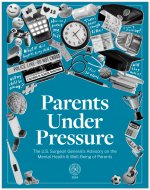
Parents Under Pressure
Omschrijving
The U.S. Surgeon General Advisory on the Mental Health and Well-Being of Parents
This Surgeon General's Advisory highlights the stressors that impact the mental health and well-being of parents and caregivers, the critical link between parental mental health and children's long-term well-being, and the urgent need to better support parents, caregivers, and families.
Surgeon General’s Foreword
Parents often say parenting is one of the best jobs but also one of the hardest. I see this reflected in the faces of new parents who radiate love for their babies through their sleep deprivation. I hear it in the voices of more veteran parents who delight in their children’s emerging personalities even as they grapple with how to keep them safe and healthy in a precarious and sometimes dangerous world. I recognize it in the wistfulness of parents whose teenagers are getting closer to leaving home for college, careers, or to start their own families.
As a parent, I have felt this way too—blessed to have the privilege of caring for my two children but also constantly wondering if I’m getting it right. I delight in their unscripted moments of pure joy, their laughter, which fills our house, and the surprising questions they ask which make me question my assumptions. I also feel the weight of the daily big and small decisions we have to make as parents that don’t come with an instruction manual. Being a dad is the toughest and most rewarding job I’ve ever had.
The work of parenting is essential not only for the health of children but also for the health of society. Additionally, we know that the well-being of parents and caregivers is directly linked to the well-being of their children. The stresses parents and caregivers have today are being passed to children in direct and indirect ways, impacting families and communities across America. Yet in modern society, parenting is often portrayed as a less important, less valued pursuit. Nothing could be further from the truth.
In addition to the traditional challenges of parenting—protecting children from harm, worrying about finances, managing teenagers who are searching for independence—there are new stressors that previous generations didn’t have to consider. These include the complexity of managing social media, parents’ concerns about the youth mental health crisis, and an epidemic of loneliness that disproportionately affects young people and parents, just to name a few.
As technological and economic forces have reshaped the world at a dizzying pace, it has also become harder for parents to prepare children for a future that is difficult to understand or predict. Parents across all backgrounds want to provide their kids with a foundation for happiness and success. Yet too many fear they won’t be able to provide what’s necessary or their kids won’t be able to access what they need in order to lead a fulfilling life. These needs are many and they vary from safe neighborhoods to admission to the right schools to stable housing. The more parents feel they are falling short of meeting their children’s needs, the more they scramble to make up lost ground.
One response to a world in which success and fulfillment feel increasingly out of reach has been an intensifying culture of comparison—often propagated by influencers and online trends—with unrealistic expectations around the milestones, parenting strategies, achievements and status symbols that kids and parents must pursue. Chasing these unreasonable expectations has left many families feeling exhausted, burned out, and perpetually behind.
Raising children is sacred work. It should matter to all of us.
Given all these factors, it’s no wonder that so many parents are struggling. In my conversations with parents and caregivers across America, I have found guilt and shame have become pervasive, often leading them to hide their struggles, which perpetuates a vicious cycle where stress leads to guilt which leads to more stress.
While some parents can access resources, including the support of a committed co-parent, extended family, and friends who share in the responsibility of raising children, many parents are managing all these challenges largely on their own. And even for those with these supports, many parents still report feeling alone.
Something has to change. Supporting parents and caregivers will require a series of thoughtful policy changes and expanded community programs that will help ensure parents and caregivers can get time off to be with a sick child, secure affordable child care, access reliable mental health care, and benefit from places and initiatives that support social connection and community.
It will also require us to rethink cultural norms around parenting. Part of that will involve shifting how we value parenting. The work of raising a child is work, no less valuable than the work performed in a paid job and of extraordinary value when it comes to the impact on the future of society. Additionally, while parents and caregivers bear the primary responsibility for raising children, society as a whole must see itself as sharing in this responsibility—and shaping policy, programs, and individual behavior accordingly.
Finally, our cultural norms must also support us talking more openly about the challenges parents face and building more community for parents whose disproportionately high levels of loneliness compound the day-to-day challenges they face.
Raising children is sacred work. It should matter to all of us. And the health and well-being of those who are caring for our children should matter to us as well. I am hopeful this Surgeon General’s Advisory will help catalyze and support the changes we need to ensure all parents and caregivers can thrive.
Vivek H. Murthy, M.D., M.B.A.
19th and 21st Surgeon General of the United States Vice Admiral, United States Public Health Service
